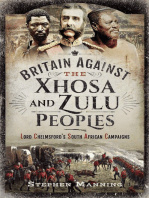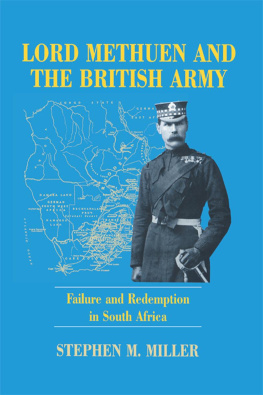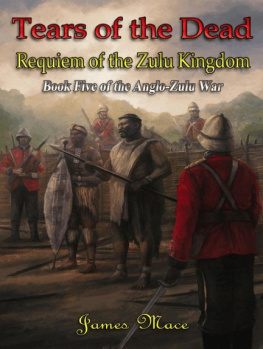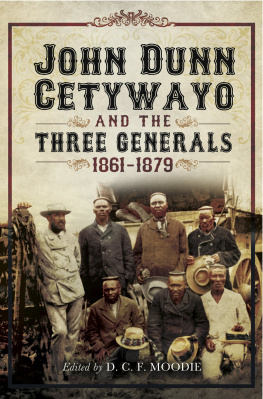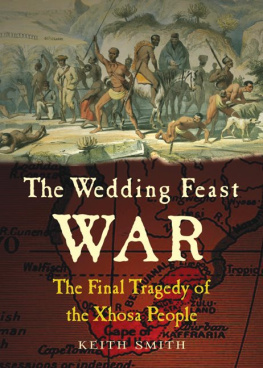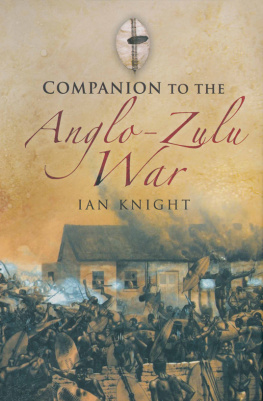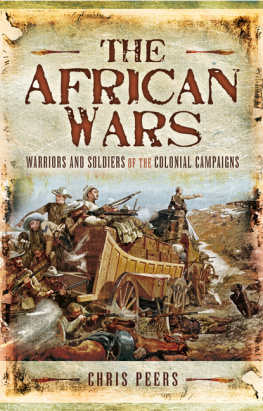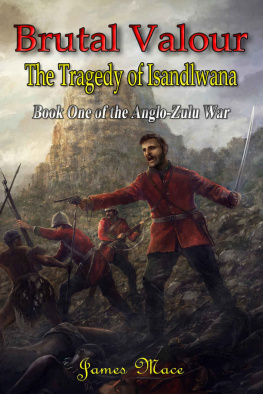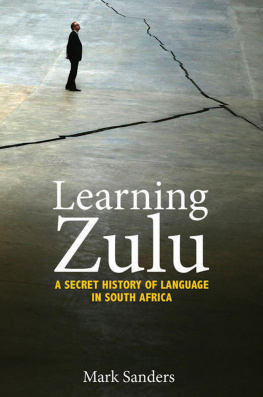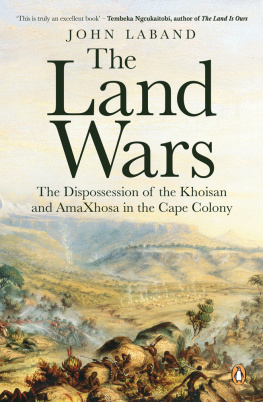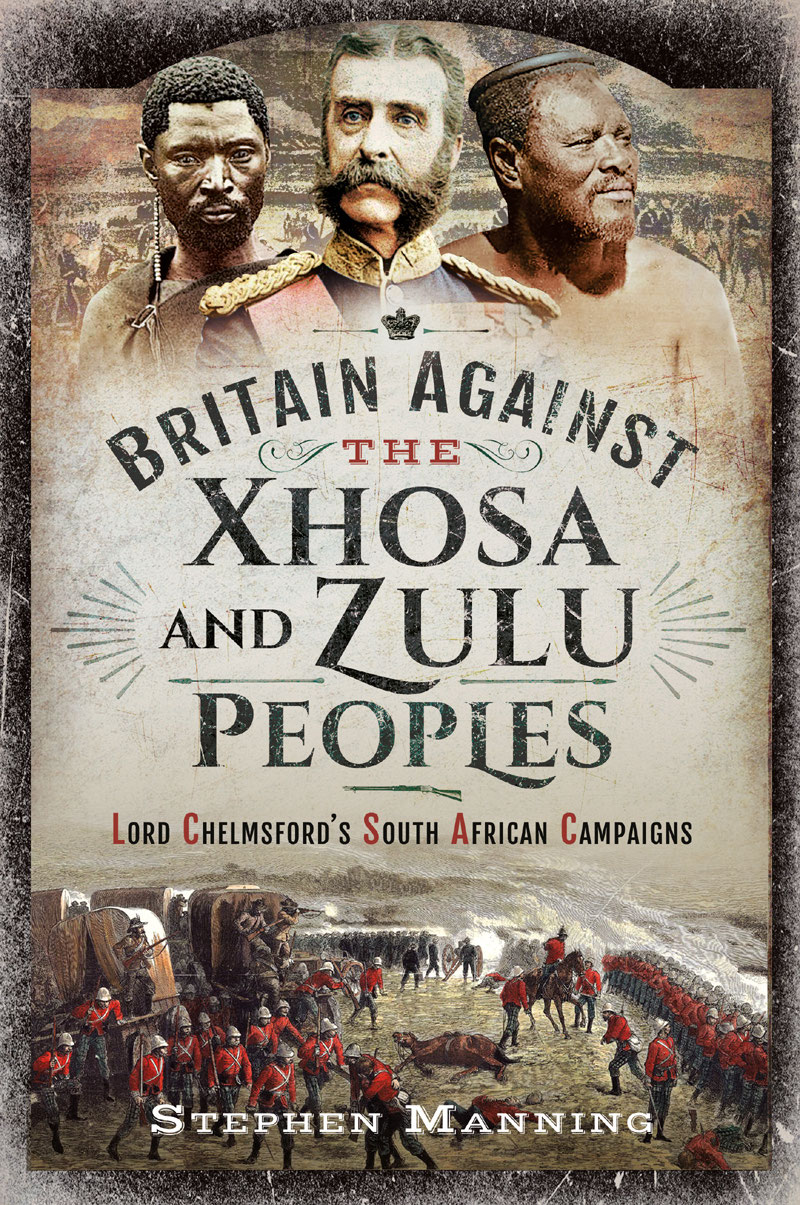
Britain Against the
Xhosa and Zulu Peoples.
Britain Against the Xhosa and Zulu Peoples.
Lord Chelmsfords South African Campaigns
Stephen Manning

First published in Great Britain in 2022 by
Pen & Sword Military
An imprint of
Pen & Sword Books Ltd
Yorkshire Philadelphia
Copyright Stephen Manning 2022
ISBN 978 1 39901 056 6
eISBN 978 1 39901 057 3
Mobi ISBN 978 1 39901 057 3
The right of Stephen Manning to be identified as Author of this work has been asserted by him in accordance with the Copyright, Designs and Patents Act 1988.
A CIP catalogue record for this book is available from the British Library.
All rights reserved. No part of this book may be reproduced or transmitted in any form or by any means, electronic or mechanical including photocopying, recording or by any information storage and retrieval system, without permission from the Publisher in writing.
Pen & Sword Books Limited incorporates the imprints of Atlas, Archaeology, Aviation, Discovery, Family History, Fiction, History, Maritime, Military, Military Classics, Politics, Select, Transport, True Crime, Air World, Frontline Publishing, Leo Cooper, Remember When, Seaforth Publishing, The Praetorian Press, Wharncliffe Local History, Wharncliffe Transport, Wharncliffe True Crime and White Owl.
For a complete list of Pen & Sword titles please contact
PEN & SWORD BOOKS LIMITED
47 Church Street, Barnsley, South Yorkshire, S70 2AS, England
E-mail: enquiries@pen-and-sword.co.uk
Website: www.pen-and-sword.co.uk
Or
PEN AND SWORD BOOKS
1950 Lawrence Rd, Havertown, PA 19083, USA
E-mail: Uspen-and-sword@casematepublishers.com
Website: www.penandswordbooks.com
To Jack Gibson
A dear friend who has been so supportive of my endeavours during the writing of this book and has travelled the Zulu battlefields with me.
Contents
Acknowledgements
Iwould like to thank the librarians at the University of Exeter and Exeter City Library for obtaining research materials for me during the challenging period of the global pandemic of the last few years. I am also grateful to Jan Dwan for her proof-reading skills and Anthony Grattan-Cooper for his ongoing advice and support. At Pen & Sword, I thank my editor, Alison Flowers, for her patience and commissioning editor, Rupert Harding, for his continuing support and trust.
Maps
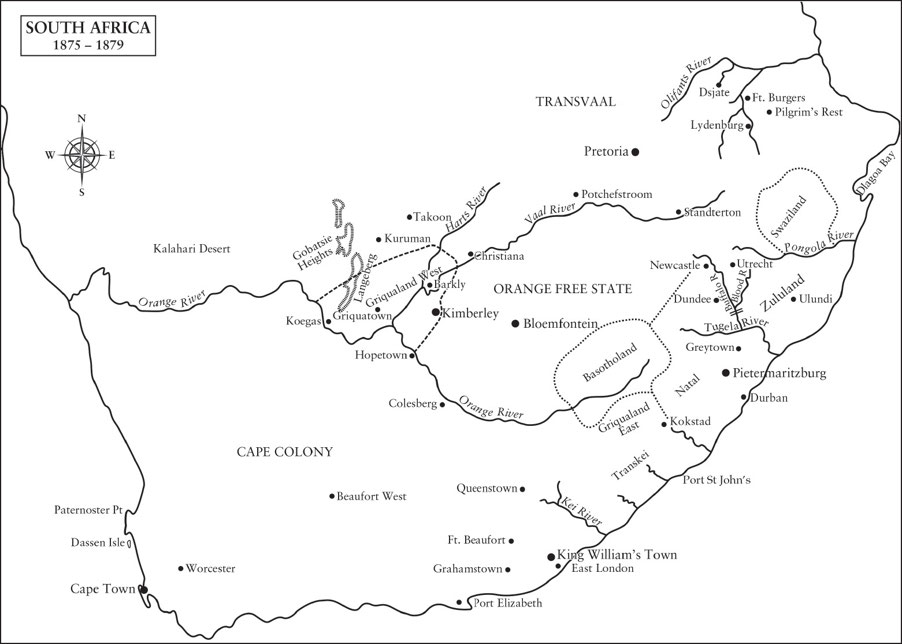
Southern Africa, 18759.
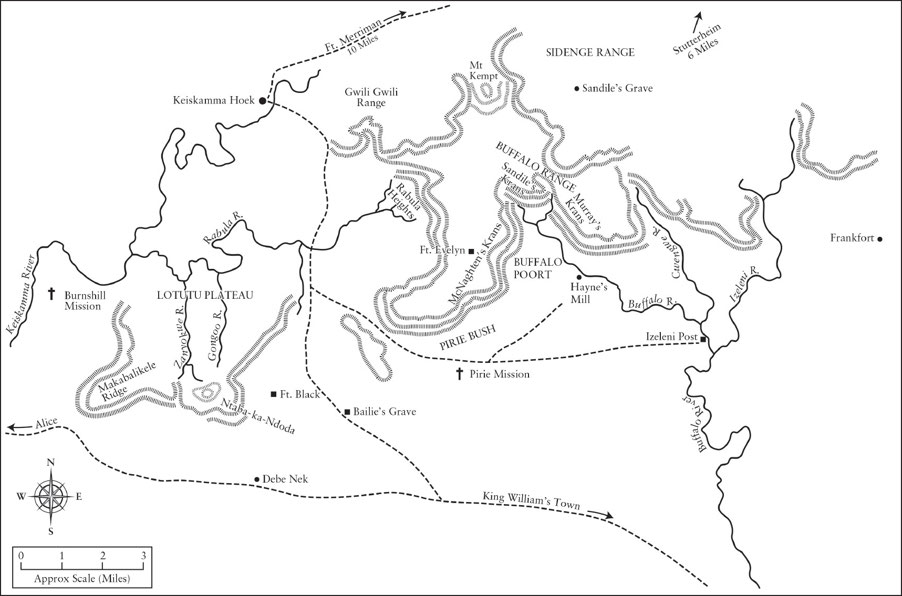
Scene of operations in the Eastern Amatholes.
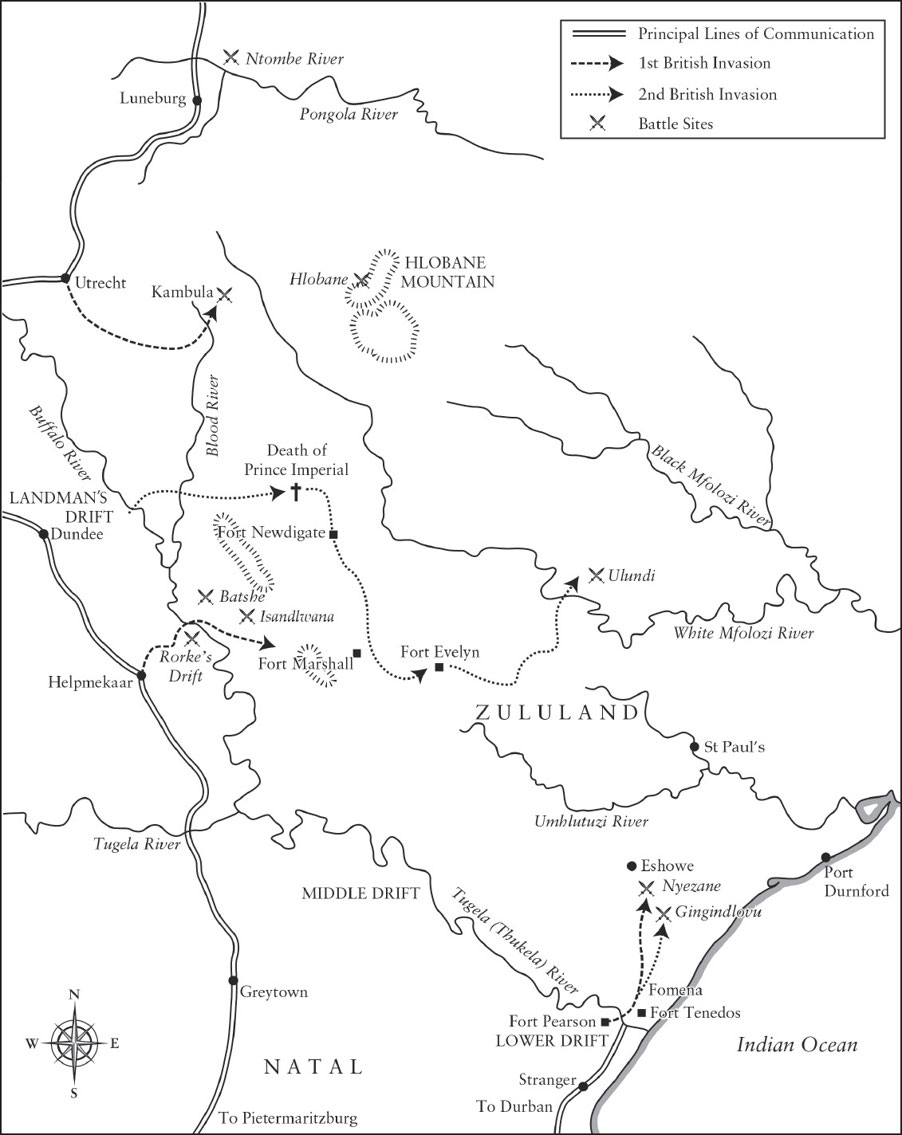
Invasion routes into Zululand.
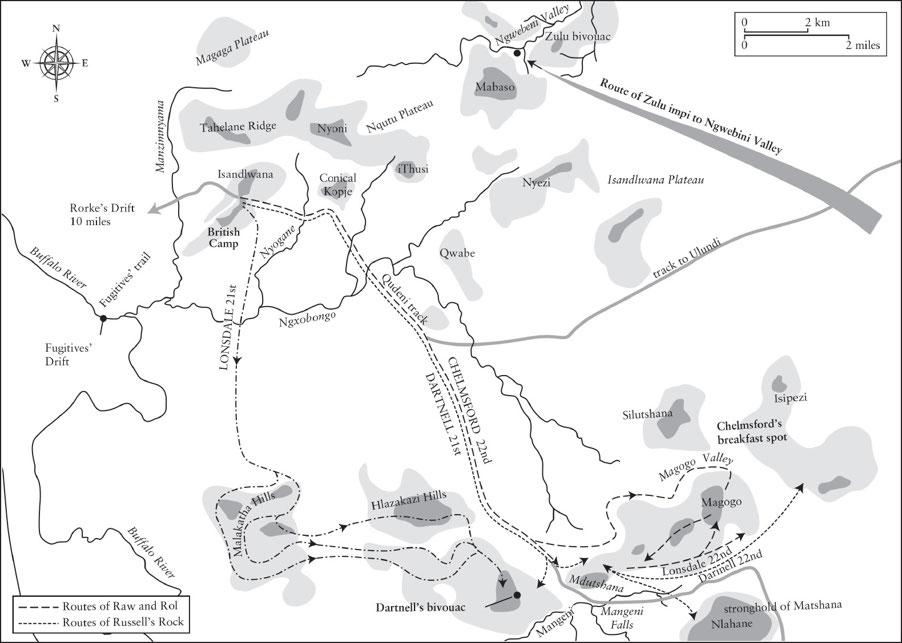
Isandlwana, 212 January 1879.
Abbreviations
| ADC | Aide-de-Camp |
| DAG | Deputy Adjutant General |
| FAMP | Frontier Armed and Mounted Police |
| FLH | Frontier Light Horse |
| NMP | Natal Mounted Police |
| NNC | Natal Native Contingent |
| NNH | Natal Native Horse |
| TNA | The National Archives, Kew |
| WO | War Office (records held at TNA) |
Introduction
This is a book about bravery, injustice, conquest and incompetence.
A brief introduction is necessary to explain the format of the book to the reader. The Anglo-Zulu War of 1879 has been written about extensively. Indeed, the word exhaustively might be used, and the subject has encouraged many historians to write their own interpretations of the events surrounding the war. This volume was never intended to be just another book about the conflict, and therefore its brief is wider. The history of British contact with both the Xhosa and Zulu peoples is examined. The events of the nine wars Britain undertook against the Xhosa, which culminated in 1878 with Frederic Thesigers final victory and the capitulation of the Xhosa, are detailed.
Thesiger, now 2nd Baron Lord Chelmsford following the death of his father in autumn 1878, moved on to to Natal where with the connivance of the High Commissioner, Sir Bartle Frere, began to assemble a force for an invasion of Zululand. No signficant biography of Lord Chelmsford has been published for many decades and this book does not claim to be that. However, it endeavours to offer a better understanding of the man and his thinking and provide fresh insight into why he made many of the fateful and fatal decisions that he did. Whilst this is not an attempt to redeem the man, the book seeks to place him in the context of his time and also illustrate that, contrary to the views held by many, he was capable of change.
Many writers on the Anglo-Zulu War have tended to not see the wood for the trees and have consequently become somewhat lost in unnecessary or even fanciful conjecture. The focus of this volume is the command of Lord Chelmsford and as such avoids lengthy descriptions of events that he did not take part in. For example, some readers may be disappointed that the text does not dwell on the clash of arms at Rorkes Drift and covers this in terms of Chelmsfords direct involvement with the aftermath of the battle. By adopting this approach an original analysis of this well-known war is offered, which it is hoped the reader enjoys as much as I have enjoyed writing it.
Dr Stephen Manning
Exeter, March 2022
Chapter 1
The Road to Ulundi
The Battle of Ulundi, fought on 4 July 1879, was the final and decisive battle of the Anglo-Zulu War. Ulundi was also the last engagement in which Lieutenant General Lord Chelmsford, Frederic Thesiger, was to command British forces in action. Chelmsford claimed a notable victory against the Zulu army and with this last act was able to resign his command and return to England with some of his battered reputation restored. Within Britain today the Anglo-Zulu War is the most well known of the many conflicts in which British troops fought during Queen Victorias reign and this can be attributed to a number of factors. Arguably, the most significant is that British soldiers, under the overall command of Chelmsford, suffered the worst defeat at the hands of an indigenous foe during the Victorian era when the Zulu army overwhelmed the British camp at Isandlwana Hill on 22 January 1879.
The defeat at Isandlwana has defined how historians have viewed Chelmsfords abilities and the consensus is that the commander was found wanting. Yet, only the year before, Chelmsford had successfully concluded the Ninth Frontier War against the Xhosa people of the Eastern Cape of South Africa and honours and praise had been showered upon him. Throughout the nineteenth century Britain engaged in a series of conflicts with the Xhosa and many a British commanders reputation was sullied as they struggled to overcome both the various tribes and the terrain of the Eastern Cape. It is to Chelmsfords credit that the Ninth Frontier War was brought to a prompt and successful end. Furthermore, Chelmsford demonstrated that he was able to learn from the mistakes of Isandlwana and his victories at Gingindlovu (2 April 1879) and at Ulundi were models of control in utilizing British troops in a defensive formation, and furthermore they showed that he had learnt to respect his brave and skilful Zulu enemy. Although numerous books have been written about the Anglo-Zulu War, few, with the notable exception of Gerald Frenchs 1939 work, have offered a defence of Chelmsford. Whilst it is undoubtedly true that he made some fundamental errors, which will be highlighted, and that his strategy for both his First and Second invasions of Zululand was flawed, it will be argued that a blanket condemnation of Chelmsford is unfair and fails to examine or properly understand the circumstances of his command.
Next page
